New allegations in football abuse scandal
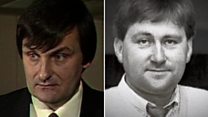
Fresh allegations of child sex abuse have been made against the founder of Celtic Boys' Club, a BBC Scotland investigation has revealed.
New alleged victims of Jim Torbett have come forward claiming he sexually abused them during the 1980s and 90s.
Torbett "vehemently denies" the allegations against him.
The investigation also reveals new claims about former Hibernian and Rangers coach Gordon Neely, who died in 2014.
An alleged victim claims he was repeatedly raped by Neely from the age of 11. It has also been claimed that when allegations of abuse surfaced, Neely was sacked from Hibs but the police were not informed.
He then joined Rangers where it is claimed he began abusing boys there. Rangers also sacked him over alleged abuse. The club claims it informed the police.
The allegations about Torbett and Neely are made in a BBC programme Football Abuse: The Ugly Side of the Beautiful Game, to be screened on Monday.
They include:
- New evidence that the reasons for Torbett leaving Celtic Boys' Club in 1974 were covered up
- Claims that Torbett was allowed to return to the Boys' Club despite being sacked for abuse
- The first evidence from former Celtic Boys' Club players claiming they were abused by Torbett in his second spell at the Boys' Club during the 1980s and 90s
- New evidence that Neely abused boys at Edinburgh youth teams and top flight clubs including Hibs and Rangers from 1980 until 1998
- Missed opportunities by football clubs and the authorities to stop Neely's abuse
Celtic Boys' Club was founded by Jim Torbett in 1966 with the permission of the then Celtic FC manager, the late Jock Stein and former chairman Sir Robert Kelly.
It was created as a separate entity from the football club, but it has been closely linked throughout its history and acted as a feeder club, producing a string of Celtic greats including Roy Aitken, Paul McStay and Tommy Burns.
Torbett had two stints at the Boys' Club, the first from 1966-1974. He returned to the Boy's Club around 1980 and stayed until a series of Daily Record stories revealed abuse claims against him in 1996.
He was jailed for two years in 1998 on conviction of abusing three former Celtic Boys' Club players, including former Scotland international Alan Brazil, between 1967-74.
At the trial, former Celtic photographer and Boys' Club chairman Hugh Birt claimed Torbett was fired in 1974 after child abuse allegations arose.
'Became a hero'
Birt, who died four years ago, told the court Stein, then honorary president of the Boys' Club, sacked Torbett as a result of the abuse claims.
The BBC has spoken to three additional sources close to the events in the 1970s who support Birt's evidence to court that Torbett was ejected from the Boys' Club by Stein, following complaints of child abuse.
Stein was then the Celtic manager as well as honorary president of the Boys' Club.
Torbett returned to the Boys' Club in around 1980 after Stein had left Parkhead. But no allegations against Torbett in his second period at the Boys' Club have surfaced - until now.
Kenny Campbell, now 44, joined Celtic Boy's Club in 1985 as a 13-year-old. A year later, he joined the U-14s, which was managed by Torbett.
He said Torbett took a special interest in him and won the trust of his parents.
Kenny told BBC Scotland: "Pretty quickly he became a hero of mine. In my mind he was doing good things [for me].
"I'd have jumped in front of a bus for him if he had asked me, guaranteed. So it was as if he had a hold over us."
He said Torbett began the abuse while he was sitting on the couch with him one night.
Kenny said this was the beginning of up to four years of sexual abuse at the hands of Torbett, which carried on even after he was signed by the senior Celtic team.
The young player didn't tell anyone: "I just thought it was natural. I just thought that was what happened," he said.
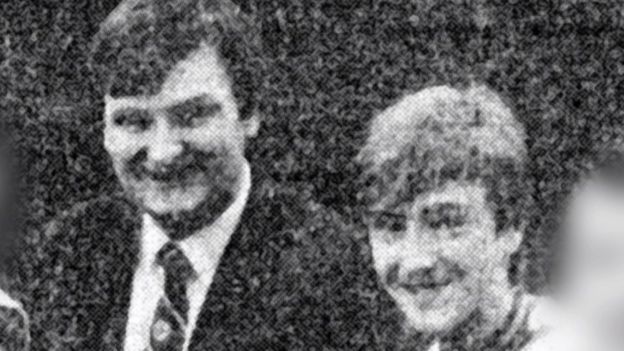 CELTIC VIEW
CELTIC VIEW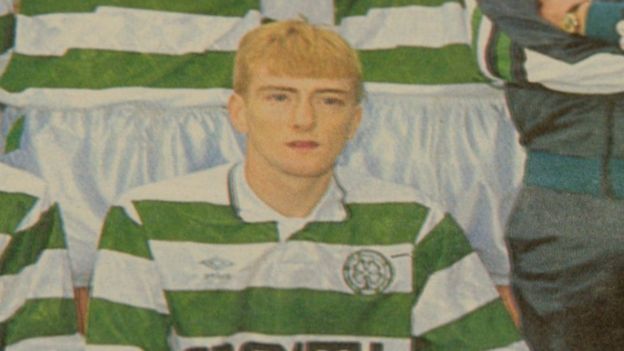 CELTIC VIEW
CELTIC VIEW
Kenny made about 20 appearances for the reserves at Celtic but illness effectively ended his Celtic career. His life spiralled into drink and drugs, but he is now clean and sober.
He said he was angry that Torbett was allowed to return to Celtic Boys' Club despite previous abuse claims.
"I feel aggrieved at that, eh, if they had never let him back in it would … never happened in the first place, I could have had a normal life, normal people round about me. If Celtic had done their due diligence … it wouldn't have happened to me."
The BBC has spoken to a second former Celtic Boys' Club player who alleges he was abused by Torbett for three years from 1990.
Torbett's lawyer told the BBC he "vehemently denies these completely false allegations".
He added: "Clearly allegations of this kind must remain in the hands of the police and due process of the law must be followed here."
In a statement, Celtic FC said the club was "fully committed to safeguarding children".
Presented with award
The statement went on: "Celtic Boys' Club was separate and distinct organisation from Celtic Football Club. It was vital that justice was served at that time, due to the extremely serious nature of this issue."
The statement added that anyone with any concerns should contact the club.
The BBC has discovered what appears to be the "official" account of why Torbett left the Boys' Club in the archives of The Celtic View, which was the sanctioned, in-house magazine for Celtic FC.
Dated November 1974, the report is headlined: "Jim bows out…after another season of glory." It states that Torbett was leaving for his own personal and business reasons and is a glowing tribute to his time at the Boys' Club. There is no mention of abuse allegations.
The BBC understands the police were never called.
The Celtic View archives also reveal that in 1977, three years after he allegedly threw Torbett out of the Boys' Club, Jock Stein was pictured presenting Torbett with an award recognising his services to Celtic Boys' Club.
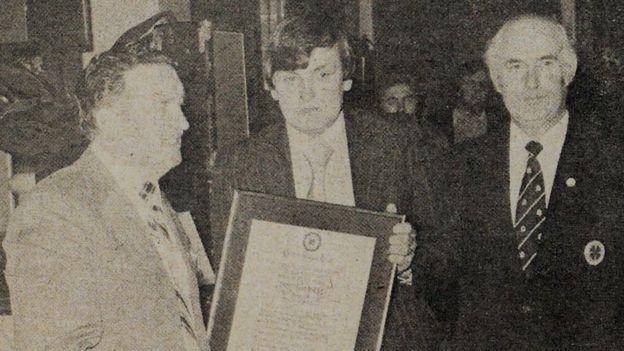 CELTIC VIEW
CELTIC VIEW
On the same evening, according to the archives, Stein made way for Celtic board member Kevin Kelly as honorary president of the Boys' Club.
Birt would tell the court in 1998 that he attempted to prevent Torbett returning to the Boys' Club and raised the issue with Celtic board members, including Kevin Kelly.
Two other sources have told the BBC that when Torbett was allowed to return to the Boys' Club in around 1980, Mr Kelly would have been aware of the previous claims of abuse against Torbett.
Mr Torbett's company The Trophy Centre had a lucrative contract with Celtic to provide branded merchandising.
Mr Kelly and Jack McGinn, a Celtic FC director from 1981, worked with Mr Torbett at his Trophy Centre business from 1986 and 1998 respectively. Their associations with the company continued long after Torbett was jailed for abuse.
Mr Kelly strongly denies being aware of allegations concerning Torbett when he returned to the Boys' Club, and told the BBC that he was not aware of any previous allegations against Torbett until his court case in the 1990s.
Jack McGinn, a Celtic FC director from 1981, also denies any previous knowledge of Mr Torbett's offending prior to his second spell at the Boys' club.
Both Mr Kelly and Mr McGinn said that if they had been aware of Mr Torbett's prior offending, they would have done all they could to prevent him returning to Celtic Boys' Club.
'I was raped'
Jon Cleland, an alleged victim of Gordon Neely, was a prodigious talent. In around 1981, at the age of 10, he joined Hutchison Vale FC, the Edinburgh football talent factory known for producing players like John Collins, Allan Preston and Leigh Griffiths.
Neely was one of the coaches at the club. He was known for an ability to spot and develop youth talent, and was well thought of in Edinburgh football circles.
Jon says he was soon targeted by Neely, and subjected to 18 months of serious sexual abuse.
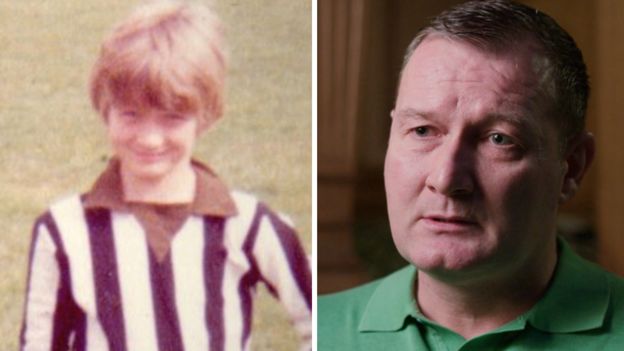
Describing his first assault at Neely's hands, he said: "He took me into a room at the back of our hall and told me to take my shorts down and he put me over his knee and he proceeded to spank me… I had done something wrong and it was my punishment. [I] didn't tell anyone."
Jon's silence seemed to be Neely's cue to escalate the abuse. Jon was 11 at the time.
He told BBC Scotland: "He said I looked like I had had an injury… then he asked me to lean over a desk, and that's when I was raped.
"At that age, hadn't a clue what was going on."
Jon said he was raped around 10 times over the next 18 months. Asked if he had been able to tell anyone, he said: "No. I couldn't have possibly at that age. I thought it was my fault. I thought I had done something wrong."
Jon began training with Hibs, but Neely was driving him to training, and abusing him in the car beforehand.
He said: "It was at that point that I couldn't do it, couldn't do it anymore. I couldn't face going to football training."
Jon said he gave up football to escape the abuse.
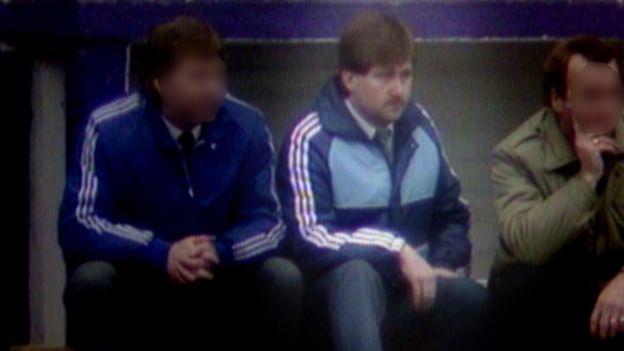
Neely took up a youth development position with Hibs in around 1983. In about 1986, abuse allegations concerning him were put to the late Hibs chairman Kenny Waugh.
Sports reporter Ray Hepburn told the BBC Waugh had confided in him.
Mr Hepburn said: "He said 'we've had complaints by two sets of parents about Gordon Neely. And his behaviour with some of the boys'.
"And of course it was quite devastating news. He went on to explain that he had sacked him that day, had reassured the parents by dealing with it in a very speedy and decisive way. And that was kind of the way people did things then."
The BBC has also spoken to the then Hibs manager John Blackley who confirmed Hepburn's story that Waugh had been made aware of complaints.
The police were never involved. Nor did anyone at Hibs warn Rangers about Neely's behaviour.

Helplines
Detective Chief Inspector Sarah Taylor, National Child Abuse Investigation Unit, Police Scotland, said: "Child abuse is incredibly difficult for people to revisit and to talk about. Our officers are highly specialist and are trained to deal with all reports sensitively. We would ask anyone who has been the victim of abuse, or has information about potential abuse to contact us."
- Police Scotland on 101
- NSPCC helpline on 0800 023 2642
- Childline on 0800 11 11

In a statement, Hibs said it was "saddened to be told that personnel at the club at the time were allegedly made aware of concerns about Neely and, again allegedly, did not contact the police.
"[This] is something which current policies and practices would prevent from happening today," the statement said.
Neely then moved to Rangers in 1986, where BBC Scotland learned the abuse continued.
One former player told the programme: "He had his own office inside Ibrox and he'd call you in and he'd make you close the door.
"He'd pull your shorts and pants down and then he'd spank you with like this rubber shoe. I mean I wasn't the only one. He'd give you 10 or twenty whacks for anything. I was only about 13."
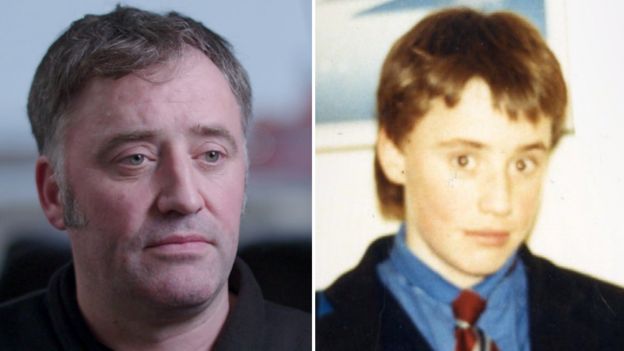
Rangers told us it was aware of an alleged incident more than 25 years ago involving Neely, sacked him and informed the police.
Police Scotland told the BBC they were unable to confirm whether Rangers made a complaint or not, despite Freedom of Information requests.
The BBC also asked surviving senior executives and football personnel who were at Rangers at that time, for more details - but received none. The Crown was unable to find details of a report being sent to the fiscal in relation to a complaint about Neely in 1990.
In a statement Rangers said: "It is understood the individual was dismissed immediately and that the police were informed.
"All employees adhered to the strictest codes of conduct."
The club added that it would "always co-operate fully" with the authorities."
Several opportunities to put an end to Neely's abuse were wasted, according to BBC Scotland's investigation, and Neely simply changed tactics, by reinventing himself as coach doing one-to-one training and activity weekends in Dunkeld, and nearby Dalguise, in Perthshire for young footballers.
One-to-one coaching
A decade after Hibs sacked him, and more than five years after Rangers got rid of him it is alleged Neely was still abusing.
"Paul," (not his real name), told BBC Scotland: "I was playing with one of the Edinburgh clubs [around 1995] and a man came up to me after a match. It was Gordon Neely. And he said he could make me a better player, and I needed some one-to-one coaching. Said he knew all the big players and managers. He was impressive.
"So every other weekend I'd go up to Dunkeld. He told me I had a condition that was hampering me. And that he could help me with it."
Paul was then abused by Neely.
"I knew it was wrong," he said. "It went on for about 10 minutes each time but I couldn't do anything. I just froze.
"I didn't want to complain because I thought it would ruin the chances of me getting the trial he'd promised me. So I just put up with it.… for almost three years."
Gordon Neely died in 2014.
The programme also features claims from former Clydebank and Rangers player Levi Stephen about a third alleged perpetrator.
Stewart Regan, the chief executive of the Scottish FA said an independent review into allegations of historic child sexual abuse in Scottish football was under way.
"We await its findings," he added.
"The latest allegations are a matter for the investigatory authority, Police Scotland.
"We would urge anyone who has suffered abuse to come forward using the dedicated, confidential NSPCC 24-hour helpline 0800 023 2642, directly to the police on 101 or via email to the Scottish FA at


No comments:
Post a Comment